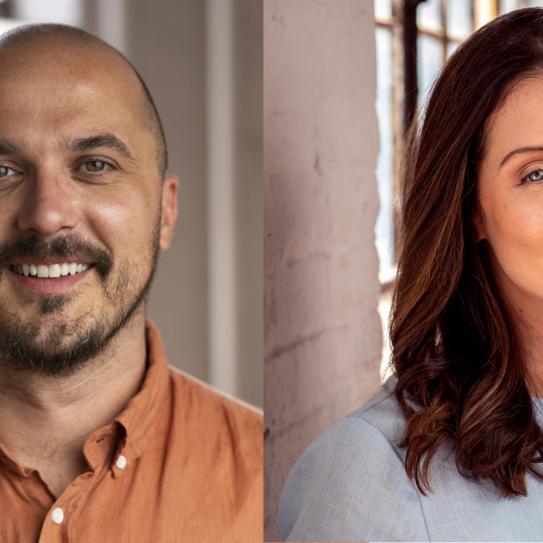The thought of starting a business with one’s spouse might make some entrepreneurs shudder. But for Carolyn Butler ’18 and Rich Amsinger ’18, they wouldn’t have it any other way. After meeting at Columbia Business School, they got married and had their first child. And it was when the pair found themselves “knee deep” in outgrown baby clothing that the idea for Manymoons was born.
Originally called Borobabi, the company is the first truly circular retailer in the country. Manymoons rents and sells clothing made from natural, certified organic materials. When you're ready for something new, it takes or buys the clothing back, restores it to a like-new condition, and sells or rents it out again. And because the company emphasizes mono-materials like cotton, when the item is ready to be retired from the cycle, Manymoons is able to compost or recycle everything it sells.
Startup Alley recently spoke with Butler and Amsinger in a wide-ranging interview that covered the company’s origins, how to build community, and the importance of understanding your customers’ pain points. They also discussed the many challenges of fundraising, and we share three of their financing tips here:
1. Don’t overvalue your company.
A startup is your baby — and naturally you’re smitten with your new business and think it’s priceless. But will investors agree? In the early rounds of funding, valuation can be highly subjective. Amsinger jokes that when potential investors ask what Manymoons’s valuation is, he tells them, “It’s whatever I think it is. That’s the way it works, right?” And while valuation is a little more rigorous than that, it’s difficult to put an exact number to a fledgling enterprise. The ambiguity can lead entrepreneurs to claim ever-higher valuations because the math can make them millionaires, at least on paper.
Butler cautions against giving in to this impulse. “You don’t want to inflate your value too much in the beginning because then when you want an institutional round [of funding], they may say, ‘Your valuation is already too high,’” she says. “You may squash your ability to raise money, so you have to do it smartly. ... It’s not like an exact science, but you just have to be careful ... and honest about it.”
.jpg)
2. Learn from every no.
Raising capital can be a grueling process, and you’ll get told no— a lot. But each no is an opportunity to improve your company and hone your presentation, Butler and Amsinger explain. Sometimes you’ll have to read between the lines to figure out why someone declined to invest, but other times, investors will say “‘I don’t write a check until I see XYZ,’” Butler notes. “And you’re like, ‘Great, that’s great information! Let me go reach XYZ goal and come back to you.’ It’s a great learning process because the more you pitch to VCs, the more you understand what VCs are looking for, and then you can make your company into a more investable business.”
3. Don’t forget about your alma mater — especially if it’s Columbia.
The CBS advantage extends beyond the classroom — and beyond graduation. After quitting their day jobs, Butler and Amsinger joined the Columbia Startup Lab, won a seed grant from the School’s Tamer Fund for Social Ventures, and successfully pitched to the Columbia Angel Network. They raised hundreds of thousands of dollars from their former classmates, and CBS mentors introduced them to a number of venture capitalists who went on to invest in Manymoons. Beyond financing, Butler and Amsinger have profited from the expertise of their CBS network, with five Columbia-affiliated professors and advisors now serving on Manymoons’s advisory board. Butler says with a laugh, “I don’t think anyone has utilized Columbia’s resources as extensively as Rich and I have!”
Check out the full podcast and find out why old-fashioned brick-and-mortar stores will always be part of Manymoons’s revolutionary business model.
